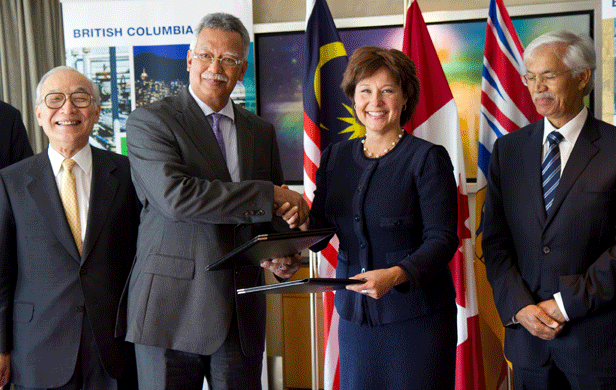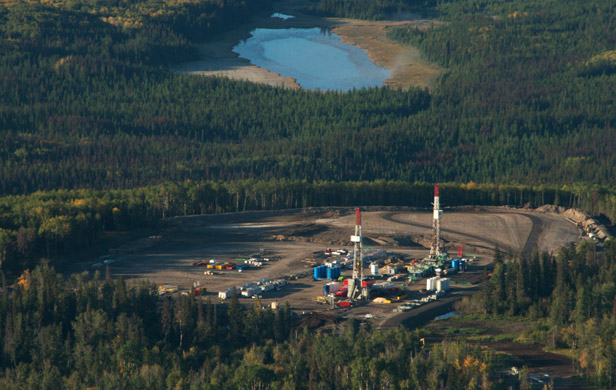
Republished with permission from the Canadian Centre for Policy Alternatives’ Policy Note.
By Marc Lee
Last week, the BC government released the text of its Project Development Agreement with Pacific Northwest LNG (led by Malaysian state enterprise, Petronas), considered the front-runner in getting BC an LNG export industry. The agreement goes to the BC legislature this week in order to convince Petronas to make a “final investment decision.” There are still other barriers to this project going forward, due to First Nations rights and the province’s environmental assessment process. The project hit a major snag when the Lax Kw’alaams first nation balked at Petronas’ proposed site for its LNG terminal. Also, the Gitga’at first nation has just launched a legal challenge for not being consulted in the development process.
Where’s the money for BC?
As far as the Project Development Agreement goes, much of the concern raised has been that the BC government is locking in the tax and regulatory regime for 25 years into the future. Changes made by subsequent governments – to the LNG tax, a special tax credit on corporate income tax, the BC carbon tax, and anything else that would affect project costs – would essentially have to pay compensation to Petronas. It is understandable why Petronas would seek such provisions, as this is a low-margin industry, and without them the company could not justify laying down tens of billions of dollars in capital investment.
However, what’s most disturbing is that this is a massive privatization of a public resource, for which the people of BC will get very little in return. Let’s look at the numbers:

Phase one of the project would produce 12 million tonnes of LNG per year for export, with a second phase that could raise that to 18 million tonnes. The actual amount of gas extracted, however, would be about 25% higher because of the huge amount of gas that would be used to extract, process, transport and liquefy the gas into exportable product.
For BC, there are two potential sources of gains: the revenues to the provincial government; and gains in employment.
Public revenues for BC depend on what price Petronas is able to get for LNG in Asia, but prices for LNG have crashed along with oil prices. It costs about $10 per mcf (thousand cubic feet) to land LNG in Asia due to the high costs of liquefaction and shipping, whereas current prices in Japan, Korea and China are much lower ($7.45 to $7.85). So any company exporting BC LNG in the current market would be losing lots of money.
Petronas can benefit despite low prices
In spite of these horrible economics, it is possible that Petronas can justify paying a premium in order to secure supply over multiple decades, or its hope is that LNG prices will rise back to earlier highs. The initial hype for LNG was based on prices around $16, which seems completely unrealistic, especially given slowing demand for LNG worldwide, combined with lots of new (mostly Australian) LNG coming into the market.
So let’s assume landed price of $12, or about $2/mcf in profit, and 12 million tonnes (=576,000 mcf) of LNG exported per year. Based on that, over the 25 years of the agreement, the landed value of that LNG would be about $173 billion, and Petronas’ profit would be almost $29 billion.
Loopholes, slashed rates mean few export taxes for BC
BC lowered its corporate income tax rate for LNG to 8% so this would represent about $1.8 billion in corporate income tax over the 25 years. That said, this revenue may not be new money – the industry and government are now arguing that LNG exports are necessary to displace lost sales to the US.
BC also introduced a 3.5% LNG income tax, but allows companies to fully deduct capital costs before paying the full tax, a process that would take 8-10 years. This notably puts taxpayers on the hook for reduced revenues should there be cost over-runs (and this is an industry known for its cost over-runs). Over 25 years, BC would collect $600 to 700 million in LNG income tax assuming no cost over-runs.

Royalties are the other key revenue source. It is important to remember that royalties are not a tax, but the public’s share of the revenues for the exploitation of a public resource. In recent years, BC has been charging low royalties to keep production high, largely due to credits to companies for fracking operations. Those low royalties have averaged 7% per year, and assuming that rate over 25 years, this would amount to about $4 billion in royalties. A new royalty agreement with the proponents suggests these could be much lower, although it is hard to say how much.
Adding these together, BC would get about $6.5 billion in additional revenues over 25 years, or just over $200 million per year. Compare that to a provincial budget of $46 billion per year, and total provincial debt of $43 billion. There are also costs to the public sector associated with infrastructure, services and so forth, so we should really be looking at net revenues.
Revenues would go up if Petronas builds phase two, and its export capacity increases to 18 million tonnes per year. And prices in Asia could venture higher, thereby increasing corporate profits and BC’s share. On the other hand, I do not account for “transfer pricing,” whereby companies shift costs in order to minimize their global taxes payable.
Jobs in the hundreds not thousands
What about jobs? The Petronas environmental assessment application estimates a peak of 3,500 temporary jobs during the 3-year construction phase of the project. After that, only 200 to 300 permanent jobs. There would likely be some additional employment upstream due to increased fracking as well, but in total the job creation is very small given the size of the venture. And that’s assuming all of these full time jobs hire people who would otherwise be unemployed; if they just shift from another part of the economy the benefits are much less. In comparison, BC has 2.4 million employed people.
For all of the hype about LNG creating jobs and eliminating our provincial debt, these real-world numbers are underwhelming to say the least. Having campaigned on that hype in the provincial election two years ago, it appears our provincial government is willing to accept a bad deal over no deal.


For a poignant overview of the Clark charge to establish a LNG industry please go to CKNW’s current audio vault, July 17 track # 14. After the preamble Mike interviews former Liberal chief of staff, Martin Brown. It should open the eyes of a few died in the wool Liberals too.
Saw this article in a newspaper in Indonesia a few weeks ago.Does Australia Pacific LNG sound a bit like Pacific Northwest LNG?Could the same thing happen to us after we have started to deliver the LNG?Renegotiate!!!!!!!Imagine where we will be when they start to ask to cut a new deal.
Christy and Rich are just babes in the woods against these big players from Asia. The BC taxpayer will be taking it on the chin and other places for decades to come.
Tuesday, 30 June 2015 | 06:39 Origin Energy Expects Chinese LNG Buyer to Fulfill Contract
Origin Energy Ltd. expects China Petrochemical Corp. to fulfill its agreement to purchase liquefied natural gas from a A$24.7 billion ($19 billion) export project in Australia.
Origin sought to reassure investors Monday amid concern the Chinese company known as Sinopec Group may not want all the gas it agreed to buy under a long-term contract with the Australia Pacific LNG project. Sinopec Group also owns 25 percent of the venture.
The development with ConocoPhillips has begun offering the initial LNG production under short-term contracts, Sydney-based Origin said in a statement. Origin said there’s flexibility over when to begin supply to Sinopec Group, which has agreed to purchase 7.6 million metric tons annually. Two calls to Sinopec Group spokesman Lv Dapeng went unanswered.
Speculation has emerged that Sinopec Group may seek to resell gas from APLNG amid delays to construction of an import terminal. The slowdown in China’s appetite for commodities has been more severe than expected, according to UBS Group AG.
“Gas demand in China is not as strong as Sinopec envisaged, and it’s likely it would like to renegotiate the contract,” UBS analysts wrote in a June 26 report. “We think it unlikely that APLNG would ever agree to a revision of the contract and it is difficult to see Sinopec walking away from it.”
Origin fell 3.5 percent to A$11.29 in Sydney trading, the lowest in almost three months, while the benchmark index dropped 2.2 percent.
The Australia Pacific LNG project remains on track for “sustained” production from the first unit in the second quarter of the 2016 financial year, Origin said.
Source: Bloomberg